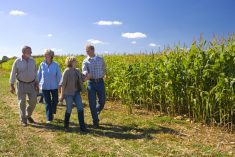Maybe it is time to consider gracefully exiting your farm business. There could be multiple reasons for the decision: just one too many tough harvests; an terrible spring for calving out cows like the one Alberta and Saskatchewan saw in 2018; children who genuinely have no desire to carry on the farm business; or perhaps, it is just time to enjoy your investment and sell.
Where do you start? Country Guide spoke with farm advisers to get their advice on successfully winding down your farm.
The big conclusion, not surprisingly, is that while there is no one formula for downsizing, knowing what you’re doing is more important than ever.
Read Also

Riding the tariff rollercoaster
Farmers are accustomed to roller-coaster years. But the current geopolitical windstorm is something else entirely. On his cattle operation near…
The first thing that Gil Dubrule in Westlock, Alta. asks a farm family who comes to him for financial advice on selling the farm is: “What does retirement look like?”
Fred Mertz in Calgary does the same. He calls this exploration of selling the farm “Discovery Day,” where family members can share their expectations. It’s essential that the husband and wife be on the same page and ready to let go, he says.
That discovery process is rarely just a day — another reason why it is essential to start the discussion early. “Selling a farm is very complicated,” Mertz sums up.
Once the picture emerges of what life after the sale should look like, Dubrule says he can predict cash-flow needs. For example, how much money is needed immediately to purchase a house in town or a recreational vehicle to allow winters down south? How much is needed for living expenses after the farm sale?
“I can then get a number to work with and a timeline as well,” Dubrule says. “Then you can plan the sale to realize cash and minimize tax.”
Jim Robinson of FNC Serecon, a land advisory company in Edmonton, also advocates starting with expectations. “Your goal should be to manage expectations and keep peace in the family as well as sell a multi-million dollar enterprise.”
However, selling land and inventory outright is rarely the way to exit the business. As farmers know too well, the tax consequences of that strategy — even with the lifetime capital gains exemption — are punishing.
Dubrule, a certified management accountant, advocates treating your farmland as an investment. Rather than sell, if land is custom-farmed to begin with and then transitions to a cash rent with the same operator, it becomes an annuity, he says. The land does two things: it provides cash flow through retirement and simultaneously is also an investment.
“The future of land is very good,” he says, adding farmland rarely decreases in value. “It offers inflation protection. The longer you hold it, the better off you are.”
His advice for selling your farm inventory — grain in the bin or cattle on the hoof — is to incorporate your farm (if not already) and put the proceeds of the sale in the company. Rather than pay 50 per cent tax on an all-out sale, the company pays corporate tax, perhaps over a number of years. Dubrule says the incorporated farm functions as a holding company that could be active for as long as 15 or 20 years until the legal and accounting fees to keep it open make it no longer viable.
Another strategy that both Dubrule and Mertz have employed when the enterprise is keen on selling land they are currently farming is to buy replacement land.
Dubrule says the Canada Revenue Agency looks at replacing “like with like and continuing the farm operation.”
Mertz has successfully used this strategy of selling and replacing land, particularly to help farmers who live close to large urban centres where the land is of high value.
Ebony Verbonac, a partner with KPMG in Lethbridge, has also seen another strategy to realize a farm sale. She says some farmers will finance the sale of their farm and land. This vendor financing arrangement functions as a mortgage for the buyer (often a neighbour) and provides cash flow for the seller while allowing deferral over time of the money received, helping with the tax bill.
Verbonac also comments on another trend, saying farmers who are winding down will often have a cash rent agreement. Renting to a neighbour who eventually buys the property is “absolutely not uncommon.” This “rent-to-own” or “lease to own” arrangement may have an explicit but more likely implicit “right of first refusal” agreement, facilitating a land sale to the tenant. “It is mostly neighbour to neighbour,” she comments.
Statistics support this trend. Robinson points out that in the 16 years between the 2000 and the 2016 Census of Agriculture, the amount of rental land in Canada grew by 3.2 million acres.
There’s another important consideration, Verbonac says. “Hopefully the farmer who has decided to sell knows what the land is worth.”
And how do you do that? Robinson says hiring a qualified, certified appraiser is one of the best ways to obtain fair market value for your land.
In Canada, there are two organizations that certify land appraisers: the Appraisal Institute of Canada (AIC) and the Canadian National Association of Real Estate Appraisers (CNAREA).
Fred Mertz agrees. He took the step of becoming a real estate agent himself, enabling him to handle the land transaction as well as see inside the tax picture.
And last, how does a farm family that has realized a sale (through whatever means) manage their lump sum?
All four financial professionals say an investment adviser should also be part of your farm sales team.
Verbonac offers this perspective: “Many farmers have been cash-strapped their entire lives.” Her advice, find an investment adviser than can make that money work for you.
Takeaways
- Have a plan to sell.
- Manage family expectations, deal with the emotional side of the sale first.
- Assemble a team of experts: accountants, lawyers, agrologists, appraisers, or find an umbrella organization that has relationships with certified land appraisers and/or real estate professionals with expertise in land sales.
- Establish a financial timeline: how much money is needed to satisfy immediate financial needs and how much for retirement living.
- If your plan includes selling, hire an investment adviser to help manage your lump sum post-sale.
Resources
Thinking of selling? Places to start your research:
- Canadian Association of Farm Advisors
- Provincial Institutes of Agrologists or the Agrology Institute of Canada
- American Association of Rural Appraisers
- Local agricultural post-secondary institutions
- Appraisal Institute of Canada (AIC)
- Canadian National Association of Real Estate Appraisers (CNAREA)















